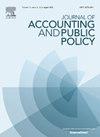新闻自由与股价崩盘风险
IF 2.2
3区 管理学
Q1 BUSINESS, FINANCE
引用次数: 0
摘要
本文考察了新闻自由这一重要的制度因素对股价崩盘风险的影响。利用2002年至2021年间52个经济体的大型国际公司样本,我们发现,新闻自由程度较高的经济体的公司与未来股价崩盘风险水平较低相关。我们的分析进一步表明,新闻自由通过增加报道强度、延长报道期限和扩大当地媒体报道范围,有助于阻止囤积坏消息。在拥有新闻自由的经济体中运营的公司表现出更强的公司治理和较低的公司特异性和长期高估水平,这可能是新闻自由减轻崩溃风险的机制。新闻自由对崩溃风险的负面影响因腐败而减弱,但对于面临更高空头利率和较少分析师报道的公司则会增强。进一步的测试表明,这种负面关系是由新闻自由多个层面的集体影响所驱动的。我们的结果经受住了一系列稳健性检查。总之,我们的研究结果表明,新闻自由通过阻止隐瞒负面信息来增强全球股市的稳定性。本文章由计算机程序翻译,如有差异,请以英文原文为准。
Press freedom and stock price crash risk
This paper examines the impact of press freedom, an important institutional factor, on stock price crash risk. Using a large international sample of firms across 52 economies between 2002 and 2021, we find that firms in economies with higher degrees of press freedom are associated with lower levels of future stock price crash risk. Our analysis further shows that press freedom helps to deter the hoarding of bad news by increasing the intensity of reporting, extending the reporting period, and broadening local media coverage. Firms operating in economies with press freedom demonstrate stronger corporate governance and lower levels of firm-specific and long-term overvaluation, which are likely mechanisms through which press freedom mitigates crash risk. The negative impact of press freedom on crash risk is weakened by corruption but strengthened for firms facing higher short interest and less analyst coverage. Additional tests reveal that this negative relationship is driven by a collective influence from multiple dimensions of press freedom. Our results survive a battery of robustness checks. In sum, our findings suggest that press freedom enhances the stability of the global stock market by discouraging the concealment of negative information.
求助全文
通过发布文献求助,成功后即可免费获取论文全文。
去求助
来源期刊

Journal of Accounting and Public Policy
Multiple-
CiteScore
4.80
自引率
2.80%
发文量
75
期刊介绍:
The Journal of Accounting and Public Policy publishes research papers focusing on the intersection between accounting and public policy. Preference is given to papers illuminating through theoretical or empirical analysis, the effects of accounting on public policy and vice-versa. Subjects treated in this journal include the interface of accounting with economics, political science, sociology, or law. The Journal includes a section entitled Accounting Letters. This section publishes short research articles that should not exceed approximately 3,000 words. The objective of this section is to facilitate the rapid dissemination of important accounting research. Accordingly, articles submitted to this section will be reviewed within fours weeks of receipt, revisions will be limited to one, and publication will occur within four months of acceptance.
 求助内容:
求助内容: 应助结果提醒方式:
应助结果提醒方式:


